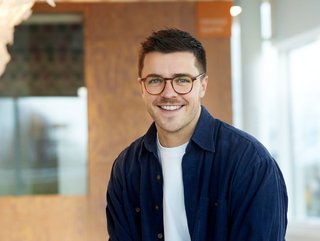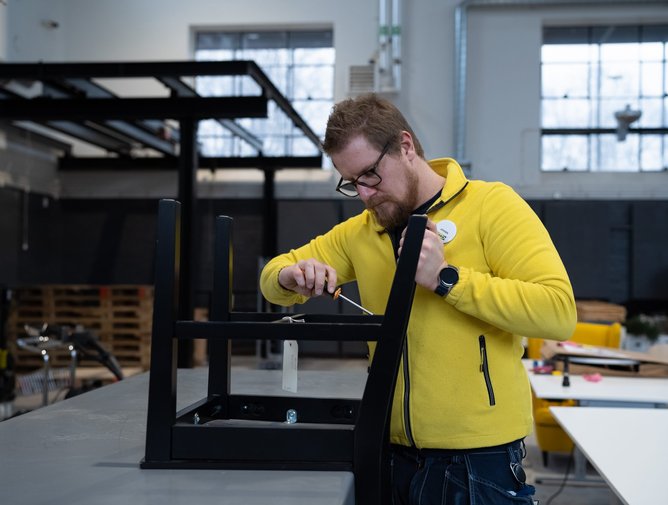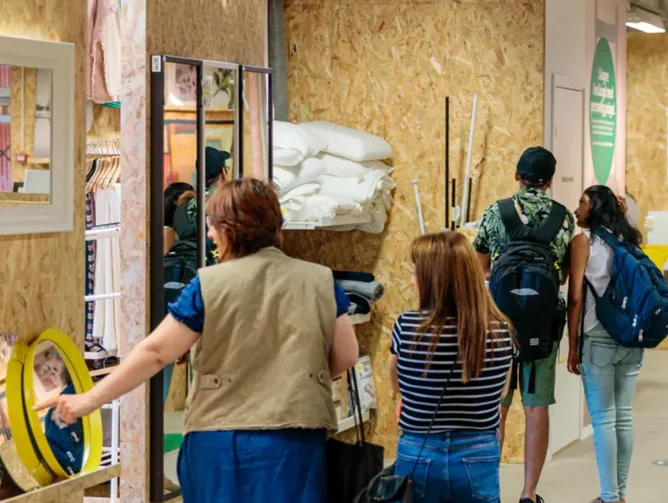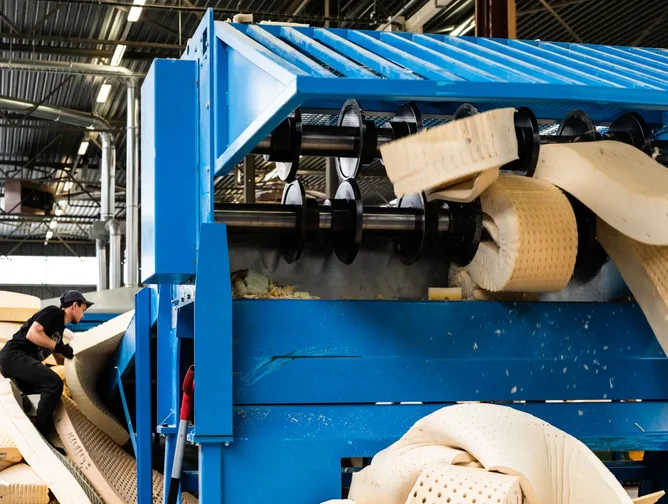Interview: Ingka Group’s Connor Hill on Becoming Circular

The latest Global Circularity Gap Report shows that just 7.2% of the world is circular. This has remained steady from last year, and there is slow progress in closing this gap.
As Ingka Group’s Circular & Sustainable Living Manager Connor Hill explains, there is still a major shift needed in society and businesses to make the circular economy a reality.
Policy has a big role to play of course, from developing incentives to prolong product life and prioritising development of common definitions and metrics for a Circular Economy, to supporting a single market for secondary raw materials (EU) and modernising and harmonising extended producer responsibility (EPR) schemes across the EU.
So too does business.
“The business sector is uniquely positioned to provide more solutions that are more circular, but critically, ensuring these are accessible, affordable, and desirable for people,” Connor tells Sustainability Magazine.
As IKEA’s People & Planet Consumer Insights and Trends 2023 study proves.
Surveying 33,000 people across 30 countries, it turns out people expect businesses to lead by example, with 66% expecting businesses to reduce climate change and 83% expecting businesses to protect and restore nature.
“It is clear the traditional linear business models of the past need to change. It is the role of business and the private sector to help innovate and scale circular solutions to enable consumer behaviour change and make it a very smooth experience.”
The largest IKEA retailer in 31 countries – and the world’s largest furniture retailer – Ingka Group believes taking concrete action is both a responsibility and opportunity.
“Our planet has finite resources, and nature and human health is under threat from the climate crisis, pollution, biodiversity loss, and excessive and unsustainable extraction,” says Connor.
“The IKEA business and the lives of people throughout the IKEA value chain are already impacted by this reality. Therefore, we need to create an IKEA business model that is more sustainable by transforming our way of working – from linear to circular.
“We know that given our size and reach, we can have a positive impact and we want to help customers to be able to take part in more circular behaviours.”
As well as proactively engaging with policy makers around the world advocating for removing policy barriers to enable a more circular economy (“We strongly support the EU Circular Economy Action Plan”) – the group has put in place an ambitious roadmap to advancing circularity.
Ingka Group Takes Full Value Chain Approach to Circularity
The goal is to become a circular business by 2030 and Connor is leading that transformation.
Described as a circular economy Changemaker, Connor has helped global organisations such as Nike, Cisco, Cambridge University and the Premier League accelerate their own circular journeys.
“Incorporating circular economy principles to minimise resource consumption and waste is a cornerstone of our sustainability strategy for 2030,” says Connor.
It’s an ambitious goal, but one that is entirely achievable given sustainability is part of the IKEA DNA.
Since the brand’s birth in 1943, IKEA has believed in doing more from less materials and being mindful with resources; and as early as 1991, introduced its first environmental policy.
Ingka Group takes a full value chain approach to circularity – and the transformation to become truly circular requires a massive rebuilding of systems, processes and operations from the ground up, explains Connor.
“It’s a transformational change and impacts every aspect of what we do, from the materials we use and how we source them, to how we design our products, how and where we meet customers, what services we develop – and once products have reached the end of their life, how we keep those materials in the loop.”

Innovative Solutions to Prolong Life of Products
Democratic design sits at the heart of the company’s circular approach, with every IKEA product following a balanced formula of form, function, low price, sustainability, and quality. Products are designed to be assembled and disassembled and reassembled again.
And the aim is for all materials used to be renewable, recycled, or recyclable by 2030.
Take IKEA’s famed BILLY bookcase, which has been redesigned to improve its circular capabilities. The new design reduces the use of plastic and shifts from veneer to paper foil. Most materials used to produce the new BILLY bookcase will come from renewable sources and the new design also has snap fittings on the back panel instead of nails, which makes it easier to repair and possible to disassemble and reassemble.
But the unique opportunity at Ingka Group is in helping products to last longer, and hopefully to have many lives.
Connor points to a “growing suite of comparatively new services” that are at various stages of testing and scaling, all aimed at prolonging the life of products, or designed to keep things going.
Like the Buyback & Resell service, where customers looking to part with their old IKEA furniture can ‘sell’ it back to the brand. Maybe, they need a bigger dining table, or a baby’s highchair is no longer required.
If the product has reached the end of its life, it is disassembled and the parts recycled. But many products are tidied up and then become available for customers in the 'As-Is' areas across 373 stores and online at a lower price.
Proving popular, more than 211,600 customers used the service in 2023, a 50% increase on the year before – resulting in the repurposing of 430,000 items, up from 230,000.
Also capturing the customer imagination in helping to prolong the lives of products, IKEA’s spare assembly parts service provides small parts like nuts, bolts, and screws to help customers maintain and upgrade products. Last year, more than 24.6 million assembly parts were dished out.
“An additional benefit here is that we can enable positive behaviour to change by making it easier for customers to maintain and upgrade, as well as give products another home when they no longer need them.
“Ingka Group is more determined than ever to show that more healthy and sustainable living can be affordable, attractive, and accessible for everyone.”

Data and Technology Essential for Advancement
For Ingka Group, data and technology are essential in advancing the circular economy cause. And as well as investing in companies developing technology to prevent waste or supply recycled materials, the group is also innovating solutions.
Like with food waste. As one of the biggest restaurant chains worldwide, through its restaurants and cafes in IKEA stores, tackling food waste is a priority.
Leveraging AI, the group uses an innovative waste watcher tool (Winnow) to pinpoint sources of waste and optimise systems.
“Our teams in our stores helped to create the tool, and it’s now being used by 400 stores around the world,” says Connor, adding that the tool played a crucial role in achieving a milestone.
In 2022, the World Resources Institute (WRI) recognised Ingka Group for efforts in halving pre-consumer food waste, in line with SDG 12, Responsible Consumption and Production.
The group also leverages tech platform Too Good To Go across 11 countries, to avoid surplus cooked and assembled food from IKEA food outlets going to waste.
Customers can use the app to buy a ‘Surprise Bag’ of surplus food at a discounted price – so far preventing more than 135,000 ‘Surprise Bags’ of food from being wasted.
Recycling a Challenge but Strategies Being Explored
While proud of the progress being made, Connor acknowledges there is much work still to be done – and among challenges, he points to the need to increase recycling rates.
“We are now reusing more materials instead of recycling them, and while this has reduced our total amount of waste, it has made it more challenging to increase our recycling rate, which has remained at around 76% for the past three years.”
To achieve net zero emissions by 2050, it is vital to achieve global recycling rates of 80-90% by 2040, thereby reinforcing the circular transition.
And to get there, the group is exploring strategies to enhance recycling rates, especially in regions without adequate recycling infrastructure, or where data collection presents challenges.
“We are actively seeking ways to enhance our data collection methods and implement end-to-end solutions to boost our recycling rate. By trialling different approaches, we are building our knowledge and experience, working towards solutions that are good for our customers, commercially viable and contribute to our commitment to transform into a circular business.”
Looking beyond its own four walls, the group is also working to help expand the recycling industry capacity, through investment arm Ingka Investments.
One example is RetourMatras, a company that takes old mattresses, strips out all the valuable materials and prepares them for putting back into new mattresses. With the capacity to recycle around 2 million mattresses per year, RetourMatras opened its first industrial scale facility last year, converting polyurethane (PU) foam from recycled mattresses into repolyol, a key ingredient for the new foam that goes into mattresses.
This has now expanded to the UK and Belgium.

Collaboration is Key to Circular Economy Success
Recognising that collaborations and partnerships are crucial in reaching a net-zero future, Ingka Group advocates for the commitments, policies and actions and plays an active role in critical discussions at major global events, from New York Climate Week to COP, WEF’s Annual Meeting in Davos, to the UN’s Food Systems Summit.
At Davos, in January, for example, the group announced a new ‘Action Speaks’ platform, in collaboration with the WEF.
“It focuses on how we eat, power, move, make, and grow and includes solutions that have already been developed with the aim to be scaled up. With this new platform we want to create a community of hope and encourage climate action at scale with real impact to support the transition to net-zero by 2050.”
The group is a member of PACE (Platform for Accelerating Circular Economy), with the CFO a board member – and is contributing to the World Business Council for Sustainable Development (WBCSD)’s Global Circularity Protocol.
“We really see the need for a unified global framework,” shares Connor.
“Collaboration and partnerships are critical to delivering our vision and our strategies, enabling us to learn from others, lead on issues where we have expertise and advocate for positive change. We engage, build partnerships, and collaborate across sectors to help advance our circular solutions.
“By exchanging knowledge and joining forces with experts in the field, we can accelerate the development of sustainable solutions.”






